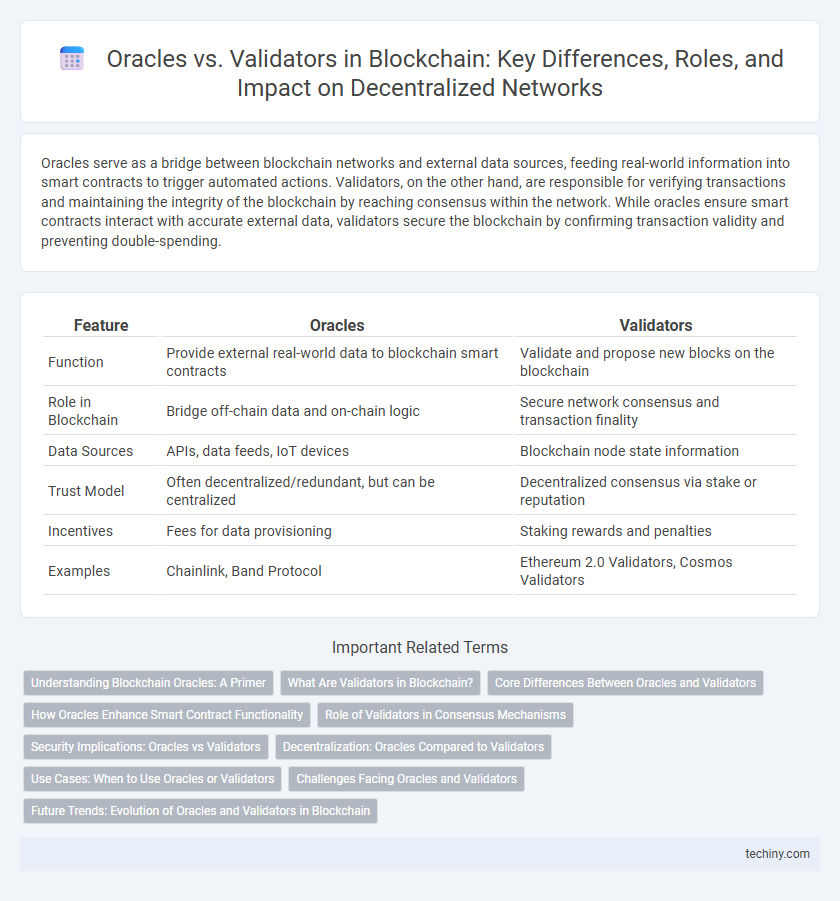Oracles serve as a bridge between blockchain networks and external data sources, feeding real-world information into smart contracts to trigger automated actions. Validators, on the other hand, are responsible for verifying transactions and maintaining the integrity of the blockchain by reaching consensus within the network. While oracles ensure smart contracts interact with accurate external data, validators secure the blockchain by confirming transaction validity and preventing double-spending.
Table of Comparison
| Feature | Oracles | Validators |
|---|---|---|
| Function | Provide external real-world data to blockchain smart contracts | Validate and propose new blocks on the blockchain |
| Role in Blockchain | Bridge off-chain data and on-chain logic | Secure network consensus and transaction finality |
| Data Sources | APIs, data feeds, IoT devices | Blockchain node state information |
| Trust Model | Often decentralized/redundant, but can be centralized | Decentralized consensus via stake or reputation |
| Incentives | Fees for data provisioning | Staking rewards and penalties |
| Examples | Chainlink, Band Protocol | Ethereum 2.0 Validators, Cosmos Validators |
Understanding Blockchain Oracles: A Primer
Blockchain oracles serve as essential data bridges between off-chain sources and on-chain smart contracts, enabling real-world information to trigger blockchain actions. Validators, in contrast, are nodes that verify and confirm transactions within the blockchain network to maintain consensus and security. Understanding the distinct roles of oracles and validators clarifies how external data integration and transaction validation collaboratively sustain decentralized applications and ecosystems.
What Are Validators in Blockchain?
Validators in blockchain are specialized nodes responsible for verifying and confirming transactions within a network, ensuring consensus and maintaining the integrity of the distributed ledger. They participate in consensus mechanisms like Proof of Stake (PoS) by validating new blocks and adding them to the blockchain, thereby preventing double-spending and fraudulent activities. Validators differ from oracles, as they focus on transaction validation within the blockchain, while oracles provide external real-world data to smart contracts.
Core Differences Between Oracles and Validators
Oracles serve as external data providers, connecting blockchain networks with real-world information to enable smart contracts to execute based on off-chain events. Validators are network participants responsible for verifying and validating transactions, maintaining consensus, and securing the blockchain protocol through consensus mechanisms such as Proof of Stake or Proof of Work. The core difference lies in oracles facilitating data input from the outside world, while validators ensure transaction integrity and network security within the blockchain ecosystem.
How Oracles Enhance Smart Contract Functionality
Oracles enhance smart contract functionality by providing reliable external data feeds that enable contracts to interact with real-world events and information beyond the blockchain. Unlike validators, which focus on confirming the accuracy and integrity of transactions within the network, oracles bridge the gap between on-chain and off-chain environments, allowing smart contracts to execute based on dynamic inputs such as price feeds, weather data, or sports scores. This integration significantly increases the versatility and practical use cases of decentralized applications in industries like finance, insurance, and supply chain management.
Role of Validators in Consensus Mechanisms
Validators play a crucial role in blockchain consensus mechanisms by verifying and validating transactions to ensure network security and integrity. They participate in proposing, attesting, and finalizing blocks, directly influencing transaction finality and preventing forks. Unlike oracles that provide external data feeds, validators maintain the protocol's decentralized trust through consensus protocol algorithms such as Proof of Stake or Practical Byzantine Fault Tolerance.
Security Implications: Oracles vs Validators
Oracles bridge blockchains with external data, presenting security vulnerabilities due to potential data manipulation and single points of failure, whereas validators secure the blockchain by confirming transactions through consensus mechanisms, minimizing risks of fraudulent activities. Validators enhance network integrity via decentralized verification, while oracles depend on external sources that may be compromised, creating attack vectors such as data spoofing or delays. Implementing decentralized oracle networks and robust validator selection protocols significantly mitigates these security risks in blockchain ecosystems.
Decentralization: Oracles Compared to Validators
Oracles play a crucial role in blockchain ecosystems by providing external data to smart contracts, yet they often rely on centralized sources, posing challenges to true decentralization. Validators, by contrast, are native participants in consensus mechanisms, directly contributing to blockchain security and decentralization through distributed verification of transactions. The comparative decentralization advantage lies with validators, as oracles introduce potential single points of failure despite recent advancements in decentralized oracle networks.
Use Cases: When to Use Oracles or Validators
Oracles are essential for integrating external real-world data into blockchain smart contracts, enabling use cases such as decentralized finance (DeFi) price feeds, insurance claim verification, and supply chain tracking. Validators play a crucial role in maintaining blockchain consensus and security by validating transactions and blocks, making them indispensable for decentralized network trust and governance. Use oracles when off-chain data inputs are required, while validators are necessary for transaction validation and maintaining blockchain integrity.
Challenges Facing Oracles and Validators
Oracles face challenges such as data reliability, security vulnerabilities, and ensuring off-chain data integrity for smart contracts. Validators grapple with issues including network scalability, consensus participation fairness, and the risk of centralization affecting blockchain security. Both oracles and validators must address these challenges to maintain trust and efficiency within decentralized ecosystems.
Future Trends: Evolution of Oracles and Validators in Blockchain
Future trends in blockchain foresee the evolution of oracles becoming more decentralized and secure through the integration of advanced cryptographic techniques and AI-driven data validation, enhancing trustworthiness in smart contract executions. Validators are expected to adopt more energy-efficient consensus mechanisms such as Proof of Stake combined with layer-2 scalability solutions, improving transaction throughput and reducing latency. The convergence of improved oracle networks with robust validator protocols will drive more scalable, transparent, and reliable decentralized applications across industries.
Oracles vs Validators Infographic

 techiny.com
techiny.com